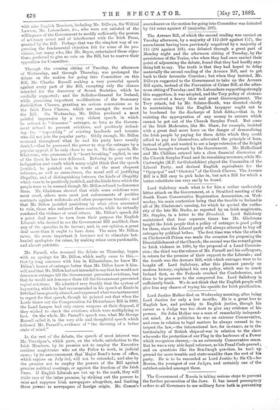The Arrears Bill, of which the second reading was carried
on Tuesday afternoon, by a majority of 112 (269 against 157), the amendment having been previously negatived by a majority of 115 (296 against 181), was debated through a great part of Monday night and the afternoon sitting of Tuesday, by the persistence of the Tories, who when they had once carried their- point of adjourning the debate, found that they had hardly any- thing left to say. The truth is that they had hoped to delay materially the second reading of the Arrears Bill, and to get back to their favourite Coercion ; but when they insisted, Mr. Dillwyn suggested to the Government to take up the Arrears Bill again, instead of the Prevention of Crime Bill, at the after- noon sitting of Tuesday; and Mr. Labouchere supporting strongly this suggestion, it was adopted, and the Tory policy of obstruc- tion received a heavy blow and great discouragement. The Tory attack, led by Mr. Sclater-Booth, was directed chiefly to maintaining that the English taxpayer ought not to be burdened for the discharge of Irish debts,—that is, to resisting the appropration of any money to arrears which cannot be got out of the Church Surplus Fund. But some of the Irish Moderates, like Mr. Shaw, for example, insisted with a great deal more force on the danger of demoralizing the Irish people by paying for them debts which they could afford to pay for themselves, advocated the principle of loan, instead of gift, and wanted to see a large extension of the Bright Clauses brought forward by the Government. Mr. Mulholland and Mr. Childers entered into a close financial discussion of the Church Surplus Fund and its remaining revenues, while Mr. Cartwright (M.P. for Oxfordshire) played the Cassandra of the Liberal Party, and devised English equivalents for the " Opopopoi " and " Otototoi" of the Greek Chorus. The Arrears Bill is a Bill easy to pick holes in, but not a Bill for which a better substitute can very easily be found.


































 Previous page
Previous page